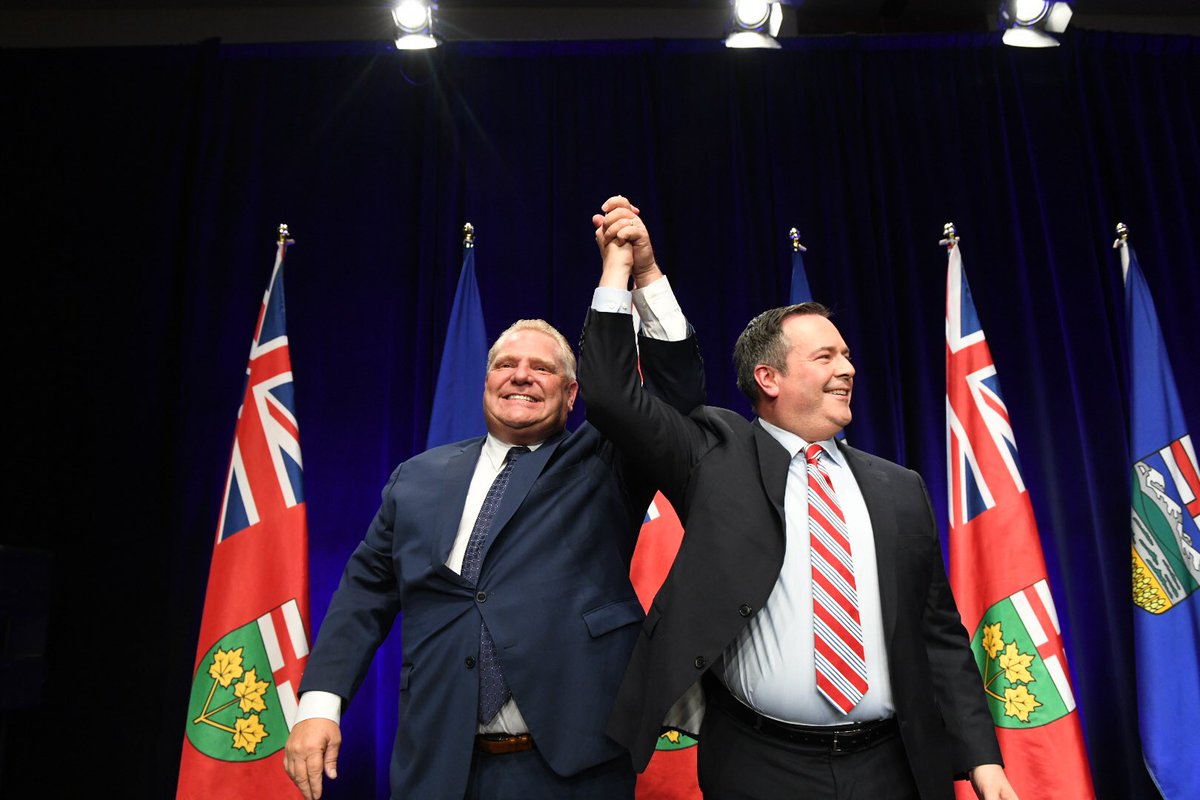
CALGARY — A raucous crowd of more than 1,500 crammed into a Calgary convention centre Friday night to hear Ontario Premier Doug Ford and Jason Kenney, leader of Alberta’s Opposition United Conservative Party, rail against the federal carbon tax.
“It’s really, my friends the worst tax ever, a tax we can’t afford, a job-killing tax that hikes up the price of services and goods and drives up the price of heating your homes,” Ford told the anti carbon-tax rally.
The crowd frequently rose to its feet waving signs that said “Renew The Alberta Advantage” and “Scrap The Carbon Tax.” Many jeered when Prime Minister Justin Trudeau’s name was mentioned.
So many people showed up that some had to listen from the hallway so as not to run afoul of fire codes.
Ford made no secret of who he will root for in Alberta’s provincial election next spring.
“Let’s elect a new United Conservative government in Alberta,” he said. “A new day has dawned in Ontario and a new day will dawn in Alberta.”
Kenney has said the repeal of Alberta’s $30-a-tonne carbon tax will top his agenda if his party wins the election.
“There is no compassion in telling seniors on modest fixed incomes that they can’t have an active life just so you can feel virtuous by imposing this carbon tax on Albertans,” he said.
“It isn’t progressive and it’s not compassionate.”
Kenney said the “multibillion-dollar job killing carbon tax” was not in the NDP’s 2015 election platform.
“It is not just the biggest tax hike in Alberta history. It is the biggest lie in Alberta history,” he said.
“Why are we engaged in this act of economic masochism when it will not make one whit of difference for the environment?”
Heavy equipment operator Steve Spackman came to Calgary from Okotoks, just south of the city, for the rally because he’s fed up.
“We’d probably hire more people at work I bet you, if they didn’t have that carbon tax every month coming in for gas,” he said.
Alberta’s NDP government introduced the provincial levy before Ottawa required it. With the Trans Mountain oil pipeline expansion in limbo, Premier Rachel Notley is now refusing to raise it in line with federal requirements.
Ottawa passed legislation last spring to give it authority to impose a carbon price on any province without its own beginning Jan. 1, 2019. It is starting at a minimum of $20 per tonne, rising $10 per year until 2022.
Ontario’s new Progressive Conservative government scrapped that province’s cap-and-trade system in July and launched a challenge of the federal carbon plan.
Provincial resistance to Ottawa’s carbon policy has been ramping up.
Saskatchewan Premier Scott Moe and Ford met in Saskatoon on Thursday, where the two conservative leaders said they will continue to fight the tax together. To that end, Moe announced Saskatchewan will file for intervener status in Ontario’s court challenge.
Ontario had already pledged to support Saskatchewan’s court challenge when the premiers met in New Brunswick in July. Moe’s government has asked Saskatchewan’s Court of Appeal to rule on whether the federal plan is constitutional.
Ford and Moe gained another ally Wednesday when Manitoba Premier Brian Pallister announced his province will not go ahead with a $25-a-tonne levy that was to come into effect in December.
“We’ll all be at the premier’s table defending common sense and Canadian taxpayers to fight against Trudeau’s carbon tax,” Ford said Friday.
Trudeau said earlier in the day that Canadians gave his government a mandate in the last election to implement a national carbon price and that is exactly what it is going to do.
“Pollution should not be free anywhere across this country,” he said at an event in Windsor, Ont.
Alberta Education Minister David Eggen said earlier Friday that Albertans should be disturbed by Ford and Kenney working together.
“Certainly we know how to solve our issues in Alberta and we don’t need someone form Ontario coming and telling us what to do,” he said.
“Our climate action plan is very effective up to now in creating jobs, helping to diversify the economy and quite frankly is helping to reduce pollution as well.”